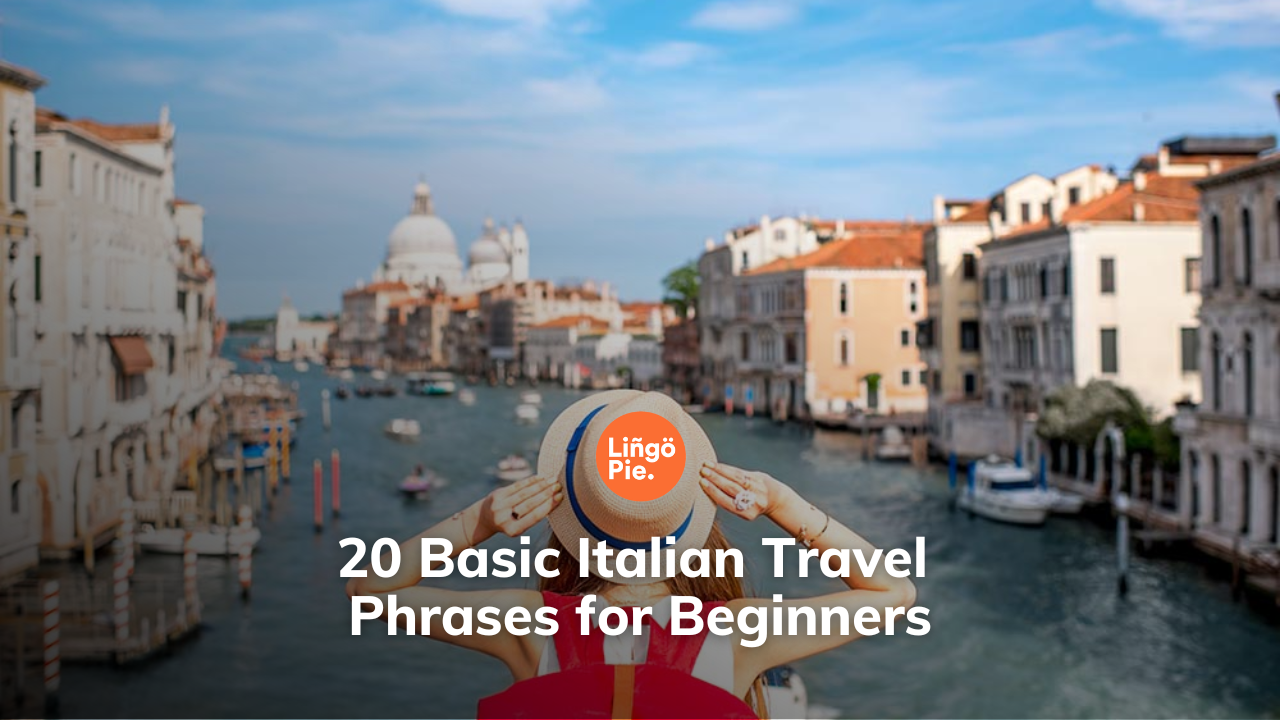Planning a trip to Italy can be exciting, but it can also be overwhelming, especially if you don't speak Italian. While many Italians in tourist areas speak English, knowing some useful Italian phrases can make your travels smoother and more enjoyable.
Learning a few phrases not only shows respect for the local language and culture but can also help you connect with locals and make new friends. The good news is that learning some common Italian phrases for travel is easier than you might think.
We've compiled 22 essential Italian travel phrases for beginners. These phrases cover basic greetings, asking for help and directions, ordering food and drinks, and emergency situations.

Learn Italian Phrases for Travel: Where to Begin
There are many resources available to help you learn a new language. You can take an online course, or use language apps, phrasebooks, and language exchange websites to help you learn Italian phrases for travel.
Practice is key, so make sure to take advantage of any opportunity to speak or listen to Italian, even if it's just ordering a coffee or catching the train (il treno). Of course, visiting Italy is one of the best ways to learn. But if an Italian trip is not in your near future, there are other ways.
You can also use streaming sites like Netflix and Lingopie to learn Italian phrases for travel. These sites boast a variety of Italian TV shows and movies that feature key phrases and useful everyday words for life in Italy.
By watching Italian-language content, you can absorb Italian vocabulary, as well as certain grammatical structures and Italian pronunciation. Learn how to form simple questions (quanto costa...?) and use the right pronouns (lei parla Inglese?) by absorbing high-quality content.
Learning through immersion is one of the best language-learning methods and a surefire way to pick up a second language. Then, you can chat with your new Italian friends with confidence and fluency.
Whether you're traveling to Italy for the first time or just looking to brush up on your Italian skills, the following phrases will come in handy during your trip.
Greetings and Introductions
When traveling to Italy, knowing some basic Italian words and phrases for greetings and introductions can help you break the ice with locals and make a good first impression.
So, learning Italian greetings is a great first step toward being able to communicate in the beautiful country of Italy.
- Buongiorno ("Good morning") and buonasera ("Good evening")
Buongiorno is used to greet someone in the morning until around midday. It's a formal greeting, so it's appropriate to use it when addressing strangers or people you've just met in Italy.
Buonasera is used to greet someone in the evening, starting from late afternoon until nighttime. It's also a formal greeting. You can say buona notte for "good night". - Come stai? ("How are you?")
Use this question when meeting someone, whether for the first or the hundredth time. It is friendly and polite. You can reply va bene ("it's going well"). - Ciao ("Hello"/ "Goodbye")
Ciao is a more casual greeting that can be used to say both "hello" and "goodbye." It's commonly used between friends or acquaintances. - Come ti chiami? ("What's your name?")
This phrase is used to ask someone their name. It's a polite way to start a conversation and get to know someone. - Mi chiamo... ("My name is...")
Use this phrase to introduce yourself by saying your name. This is the response to come ti chiami? (informal) or come si chiama? (formal). - Piacere di conoscerti ("Nice to meet you")
This is a polite and friendly way to start a conversation after introducing yourself.
By learning and using these Italian phrases for greetings and introductions, you'll be able to make a good first impression and start conversations with locals during your travels.
Remember to adapt the level of formality of your greetings based on the situation and the person you're speaking to.
Asking for Help and Directions
When traveling in a foreign country, it's common to get lost or need help finding your way around.
Knowing some simple Italian words and phrases for asking for help and directions can come in handy during these situations.
- Mi scusi ("Excuse me")
This is a polite way to get someone's attention. You can use it to ask for help or to start a conversation. - Parla inglese? ("Do you speak English?")
If you're having trouble communicating in Italian, this phrase can be helpful to ask if the person you're talking to speaks English.
You can also say parlo Italiano ("I speak Italian") or non parlo Italiano ("I don't speak Italian") if asked. - Dov'è...? ("Where is...?")/ Dove sono... ("Where are...?")
Use these phrases to ask for directions to a specific place. You may ask dov'è il bagno, where il bagno means "the bathroom".
You might also ask dov'è la stazione ("where is the train station?") or dov'è il ristorante? ("where is the restaurant?"). - Quanto costa questo? ("How much does this cost?")
If you're shopping or eating out, this phrase can be useful to ask for the price of something. Mi scusi, quanto costa il biglietto del treno means "excuse me, how much does the train ticket cost?" - Non capisco ("I don't understand")
If you're having trouble understanding what someone is saying, you can use this phrase to let them know that you don't understand. - Mi dispiace ("I'm sorry")
Couple the latter phrase with "I'm sorry" to add to the level of politeness.
By learning and using these useful Italian phrases for asking for help and directions, you'll be able to navigate your way around Italy more easily and communicate effectively with locals. Remember to use a friendly tone and body language to show your appreciation for their help.
Ordering Food and Drinks
Italy is known for its delicious cuisine, and trying out local dishes is an essential part of any trip to Italy.
Knowing some basic Italian phrases for ordering food and drinks can help you get the most out of your dining experience.
- Vorrei... ("I would like...")/ Ho bisogno di un... ("I need...")
Use this phrase to order something from the menu. For example, you can say vorrei una pizza margherita, per favore ("I would like a margherita pizza, please"). - Per favore ("Please")
This is a polite word that can be added at the end of a sentence when making a request. For example, posso avere il menu, per favore? ("Can I have the menu, please?") - Grazie mille ("Thank you very much")
Use this phrase to show your appreciation after someone has served you or brought you something. - Di niente ("You're welcome")
This response to grazie is a phrase you'll use all the time in Italy. - Salute! ("Cheers!")
If you're having a drink with friends, this is the Italian word for "cheers." - Posso avere il conto, per favore? ("Can I have the bill, please?")
Use this phrase when you're ready to pay for your meal in a restaurant.
These basic Italian phrases will help you to enjoy your trip more fully and soak up the Italian culture better. Don't be afraid to try new things and ask for recommendations from locals. Remember to use a friendly tone and show your appreciation for their service.
Basic Italian Phrases for Emergencies
No one wants to think about emergencies while traveling, but it's important to know some essential Italian phrases in case you need help.
- Aiuto! (Help!)
This is a general cry for help that you can use if you're in a dangerous situation and need someone's attention. - Chiamate la polizia! ("Call the police!")
If you're in a situation where you need the police, use this phrase to ask someone to call them. - Chiamate un'ambulanza! ("Call an ambulance!")/ Bisogno di un dottore ("I need a doctor")
If you or someone else needs medical assistance while you're visiting Italy, use these phrases to ask someone to call an ambulance. - Dov'è il pronto soccorso? ("Where is the emergency room?")
If you need to go to the emergency room, use this phrase to ask where it is located. For example, Dov'è il pronto soccorso più vicino? (Where is the nearest emergency room?)
By learning Italian-language phrases for emergencies, you'll be prepared in case of a dangerous or medical situation. Remember to stay calm and speak clearly when asking for help. Start learning at home today so you are prepared.
FAQs About Learning Italian Travel Phrases
Let's have a look at some frequently asked questions relating to basic Italian words and useful phrases for travel.
What are some common Italian words for travel?
Some common Italian words for travel include un taxi, meaning "a taxi", buongiornno ("good morning") and per favore ("please"). You might also want to scrub up your food vocab, such as vino della casa , "the house wine", vino rosso "red wine", vino bianco, "white wine" and la salsa è piccante? ("is the sauce spicy?").
What are some common Italian phrases?
Some common and useful Italian phrases for travel and ordering meals include che cosa ci consiglia? ("what do you recommend?") and buon appetito! ("enjoy your meal!"). Most Italians will be impressed by your restaurant-appropriate vocab. Sharing meals is a big part of the Italian culture and will be a significant aspect of your vacation when you visit Italy.
How can I learn to speak Italian at home?
You can learn to speak Italian at home by watching Italian TV, listening to Italian music, and reading the Italian news. Just as you learned your first language through immersion and exposure, so too can you learn Italian in this way. You can use the Intrepid Italian video courses online to speed up the process.

Summing Up: 22 Basic Italian Travel Phrases for Beginners
Now that you have learned these 22 useful Italian words and common phrases for travel, you are well on your way to becoming an Italian speaker.
You just need to make sure you practice every day, either with a language partner, a language app, or a great streaming service.
The more exposure you get to Italian, the faster you will develop your skills. You can also access travel tips free by reading more language learning and travel blogs.
Have a great trip to Italy and remember to bring this helpful vocab list with you. Head over to Lingopie now to start binge-watching awesome Italian movies and shows.





![Learn Spanish with Slang Las Chicas del Cable [Cable Girls] on Netflix](/blog/content/images/size/w1200/2023/05/Spanish-1-1.png)
![How Many Italian-Speaking Countries Are Out There? [2025 Data]](/blog/content/images/size/w300/2025/06/Italian-speaking-countries.jpg)


